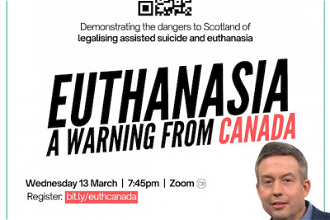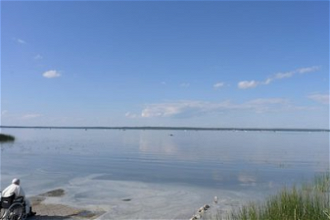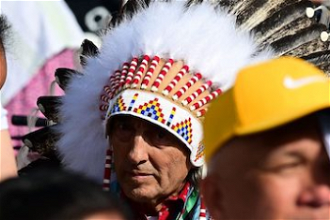Canada: Faith communities speak out on Climate Change, Poverty and Indigenous Rights

Canada's faith communities have issued a joint statement today on Climate Change, Poverty and Indigenous Rights. The full text follows:
Introduction - Climate change and poverty
1. In our day, the causes and effects of global climate change are becoming more and more visible. The measurable amount of carbon dioxide in the atmosphere has surpassed 400 parts per million, more than at any time in recorded human history. This most serious development is caused mainly by humans removing forests and burning fossil fuels, namely oil and gas.
We see the interconnected effects of these unprecedented levels of carbon dioxide in the Earth's atmosphere: rising average global temperatures leading to more extreme weather and related disasters that affect ever greater numbers of people; changing ocean chemistry and its seemingly irreversible impact on marine life; and the declining diversity and health of land-based communities of plant and animal life. These effects are causing the precious and unique environment for life on Earth to fall into serious disrepair.
2. In our day, we still see and experience widespread poverty despite the abundant production of food and availability of the basic necessities of life in Canada. When the wealth and sharing gap between those with access to more resources and those with fewer resources widens, it is the poorer communities who feel the effects of ecological and economic changes sooner and for longer periods: the traditional livelihoods of communities in the Arctic is undermined; access to health care services for newcomers and refugees is reduced; income and life support services for the young and old declines; and First Nations peoples face serious social and economic challenges.
3. Today we understand these twin challenges are linked by a spiritual, moral and ethical human crisis that can be expressed in this question: how will Canadians act as a good neighbour in both the natural and human communities since in the long run the health of one depends on the health of the other?
Faith Communities in Canada
4. People of faith have a long tradition of joining together to promote health care, education, social service and to advocate for peace and the common good. Through religious institutions we aspire to model and teach faithful living in response to a divine imperative of love and care for all. This statement lights a path for people of faith and good will to walk together in their shared efforts of education, reflection, civic participation and action.
5. On March 8, 2011 the Interfaith Declaration on Faith and Poverty: A Time for Inspired Leadership and Action was signed after reflection and meetings on Parliament Hill. Similarly, on October 25th, 2011 the Canadian Interfaith Call for Leadership and Action on Climate Change was signed by over 60 faith community leaders. Faith communities have studied and attempted to live into these calls to action. Today more needs to be done. Our work for justice, human wellbeing, and a liveable planet are now joined.
6. Member states of the United Nations will adopt a global commitment to Sustainable Development Goals in September 2015 as well as a new international agreement to lower greenhouse gas emissions at the United Nations Climate Change Conference (COP21) in Paris in December 2015. Here in Canada we are approaching Canada's 150th anniversary and a Federal election is scheduled for October 2015.
7. We cherish opportunities to share the beliefs and values that come from our scriptures and guide us: a balanced relationship between people and the environment, an ethic of care for the poor and disadvantaged, and support for the well-being of all. The ethics of right relationship in social, economic and environmental policies is so urgently needed in our country and our global community. So it is timely that in 2015 we again join voices of faith in prayer and action on promoting climate justice and ending poverty in Canada.
Promoting Climate Justice in Canada
8. In 2009 Canada committed to addressing climate change by lowering our greenhouse gas emissions. According to the Commissioner for the Environment, these targets are not likely to be met. A new target has been announced in preparation for the Paris climate conference: it is the least ambitious target of all G-7 countries announced to date. Together with other G-7 country leaders our Prime Minister has committed to decarbonize our economy by 2100. We need a comprehensive plan, with the appropriate policies in place and the full encouragement of Canadians, to keep our promise to reduce emissions, meet or surpass the agreed targets, and so do our part in slowing the effects of climate change. The rapid advances in solar energy systems in the past five years make this change from a carbon energy economy to a renewable energy economy technically and economically feasible. Leadership and citizen support are now needed.
9. As faith community leaders we understand the climate crisis demands more than technical fixes - a spiritual and moral, even ecological transformation is needed. We commit to play our part to honestly and directly name our current crisis, to raise our awareness of its urgency, to encourage transformative actions that change our consumption based economy of growth into a stewardship economy of care, and to develop our own community operations and use of buildings in ways that respect sustainability standards and the ecological integrity of human and natural life.
10. As we approach the United Nations COP 21 meeting in Paris at year end, we respectfully call upon our government to develop a Federal plan for leadership on climate that connects and coordinates federal, provincial and municipal jurisdictions and provides global leadership to:
a) Positively influence negotiations in Paris to conclude a binding international agreement ensuring the long-term stability of our climate. Scientists tell us that this requires global average temperatures to remain well below a 2 degree Celsius increase from pre-industrial levels;
b) Establish more stringent and ambitious emission targets in Canada by working with all levels of government to put in place a range of policies which could include: a price on carbon emissions, developing and promoting a national renewable energy policy, ending fossil fuel subsidies, and encouraging through public policy the creation of an increasing number of high quality, sustainable jobs in the renewable energy sector;
c) Provide material assistance to assist the poorest and most affected countries to adapt to and mitigate the impacts of climate change. This could be achieved by means of the UN's Green Climate Fund (Canada's annual fair share in new disbursements would be at least $500 million).
Ending Poverty in Canada
11. Dignity for All: The campaign for a poverty-free Canada, supported by many faith communities, reports that almost 4.8 million Canadians struggle to make ends meet. Motions in Parliament have been passed, studies presented and recommendations delivered all aimed at the development of a national anti-poverty plan for Canada - yet food bank usage has increased by 25% since the 2008-9 recession.
12. Many Canadian faith communities work actively to mitigate poverty. Faith communities will continue to deliver services and programs to hungry Canadians, provide shelter to the homeless, and settlement resources to newcomers. Along with services for and with people in poverty, faith communities have a long history of faithful advocacy to
government and other societal institutions for structural reforms that aim to eliminate poverty.
13. As the United Nations General Assembly meets to adopt the Sustainable Development Goals (SDG) in September, we note that the first SDG calls on states to end poverty in all of its forms, everywhere, including at home. Thus, we respectfully call upon our government to develop, legislate and implement
a federal plan for poverty elimination that complements provincial and territorial plans that, among other public policies:
a) Ensures sufficient federal investment in social security for all Canadians. This could include increasing financial assistance to low-income families with children, expanding eligibility for Employment Insurance, and by working toward a minimum basic income for all citizens;
b) Includes adequate federal funding for social housing;
c) Introduces a more comprehensive system of early childhood education, affordable care, and support for parents of young children.
Indigenous Peoples in Canada
14. Indigenous Peoples in Canada have long experienced the effects of poverty, and are commonly among the first to experience the effects of climate change. As the first human inhabitants and caretakers of the land First Nations, Métis and Inuit Peoples offer important insights from which we all need to learn. Walking together we can face the challenges of creating new covenants and improved relationships to promote climate justice and end poverty.
15. We welcome the Truth and Reconciliation Commissioners' Calls to Action as providing the basis for wide and transformative conversations and actions among Canadians around the better future we intend to foster. Faith communities who long to live in a society grounded in right relationships and equity will continue to seek and live into reconciliation with Indigenous Peoples. We will do so when led by, and accompanied by, Indigenous Peoples, so as to ensure authentic processes in developing renewed relationships, especially in schools and educational programs.
16. We will encourage the wider changes necessary in our society so that true reconciliation is unimpeded. Thus, we respectfully call upon our government to respond fully to those recommendations directed to government in the final report of the Truth and Reconciliation Commission on Indian Residential
Schools (TRC), including:
a) Use the United Nations Declaration on the Rights of Indigenous Peoples as the foundation for improved relations with Indigenous Peoples and publish regular accounts concerning its implementation;
b) Lead and fully participate in an inquiry into the tragic and continuing reality of missing and murdered Indigenous women and girls;
c) In coordination with Inuit, Métis, First Nations including urban Aboriginal communities, address specific funding needs for clean water, health care, housing. Similarly, we echo the TRC report in calling upon the Federal government to ensure equal federal funding for First Nations children being educated on reserves and those First Nations children being educated in comparable off reserve locations, in order to facilitate those communities taking charge of their own education.
17. The undersigned faith communities are united in our prayer that climate justice, the eradication of poverty, and a new foundation for the wellbeing of Indigenous Peoples become beacons of our commitment to becoming good neighbours - working together and with our elected governments - in these important last months of 2015 and beyond.
May the Creator guide us as we continue in the work of healing, justice, and right relations "and guide this country on a new and different path." (Remembering the Children: 2008)
Signed by Leaders of Faith Communities
The Most Reverend Fred Hiltz Archbishop and Primate The Anglican Church of Canada
Patriarch Apostolic Catholic Church of Canada
His Grace Bishop Abgar Hovakimian Primate Armenian Apostolic Church Canadian Diocese
The Rev John Tonks President Canadian Association for Baptist Freedoms
+Douglas Crosby, OMI Bishop of Hamilton and President of the Canadian Conference of Catholic Bishops
Elaine Bishop Clerk Canadian Yearly Meeting of the Religious Society of Friends (Quakers)
Rev Richard E (Rick) Hamilton Regional Minister Christian Church (Disciples of Christ) in Canada
Dr John Florentine Teruel
The Rev Darren Roorda Canadian Ministries Director Christian Reformed Church in North America
LK (Rev Fr) Messale Engeda Head Priest and Administrator of The Ethiopian Orthodox Church of Canada
The Rev Susan C Johnson National Bishop Evangelical Lutheran Church in Canada
Dr Geevarghese Mar Theodosius Bishop of the North American Diocese Mar Thoma Church
The Rev. Willard Metzger General Secretary Mennonite Church Canada
+Irénée Archbishop of Ottawa and the Archdiocese of Canada Orthodox Church in America
Most Rev Anthony Mikovsky Acting Diocesan Bishop Polish National Catholic Church of Canada
The Rev Karen R Horst Moderator of the 141st General Assembly The Presbyterian Church in Canada
Commissioner Susan McMillan Territorial Commander The Salvation Army Canada and Bermuda Territory
The Rev John Kapteyn Clerk Regional Synod of Canada, Reformed Church in America
His Eminence, The Most Rev. Metropolitan Yurij (Kalistchuk) Archbishop of Winnipeg and the Central Eparchy
Primate of the Ukrainian Orthodox Church of Canada
The Right Rev Jordan Cantwell Moderator The United Church of Canada
Rev Zenji Nio
Abbot-in-Chief, Panam Buddhist Temple
President, World Buddhist Council
Dr Amritpal Singh Shergill
President
World Sikh Organization of Canada
Leaders of Faith-Based Organizations
Canon Dr Alyson Barnett-Cowan President The Canadian Council of Churches
Dr Doug Blomberg President Institute for Christian Studies
Rev Dr Terry Smith
Deputy Executive Director
Canadian Baptist Ministries
Pascale Frémond, President Religions for Peace, Canada
Will Postma. Chair of the Board, Citizens for Public Justice
Source: Canadian Council of Churches
(The Canadian Council of Churches represents 25 denominations of Anglican; Evangelical; Free Church; Eastern Orthodox and Oriental Orthodox; Protestant; and Catholic traditions. Together we represent more than 85% of the Christians in Canada. The Canadian Council of Churches was founded in 1944.)





















